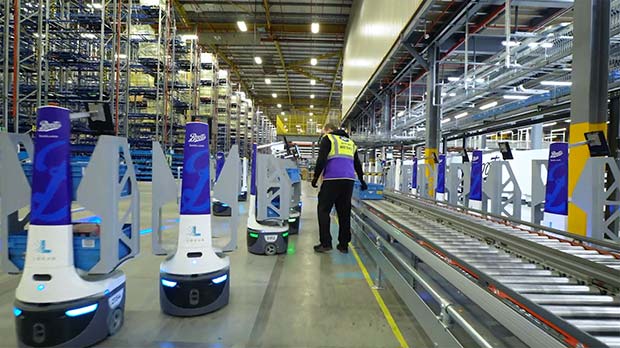To ensure basic supplies and essential services could be maintained during a succession of lockdowns, logistics operations in the UK have been stress-tested like never before. New solutions have had to be implemented quickly by the warehousing and logistics sector as a response to massive spikes in demand, high customer expectations, social distancing restrictions, self-isolating staff and much more.  If the current circumstances continue then challenges will remain, not least for labour requirements. Warehouse operators must be prepared to deal with shortages in labour not just during peak periods but throughout the year. The inevitable consequence of this is a dwindling labour pool and just as with any commodity in high demand, rising costs. E-commerce fulfilment operations could well be tested more than most, reliant as they have been on drafting in huge armies of temporary staff to meet peak demand.
If the current circumstances continue then challenges will remain, not least for labour requirements. Warehouse operators must be prepared to deal with shortages in labour not just during peak periods but throughout the year. The inevitable consequence of this is a dwindling labour pool and just as with any commodity in high demand, rising costs. E-commerce fulfilment operations could well be tested more than most, reliant as they have been on drafting in huge armies of temporary staff to meet peak demand.
However, in the current climate this will be harder than ever. Fulfilment centres in the UK are therefore having to wring maximum benefit from the resources they have. But factor the need to have workers socially distance themselves, and the situation instantly becomes more challenging.
Making the workers you do have far more productive becomes highly desirable.
“Effective picking solutions such as the Autonomous Mobile Robot (AMR) system offered by Locus Robotics have helped businesses in the sector double their productivity without doubling their workforce,” said Denis Niezgoda, Vice President – Europe, Locus Robotics.
“Taking away the need for workers to haul heavy carts around the warehouse and have them located instead, close to their picking area, instantly cuts out hours of unproductive walking time on their part as the cobots convey picked items to the packing areas.”
Data from the LocusBot programme can upgrade efficiency by improving pick accuracy and minimising costly and time-consuming errors.
But it is the scalability of the LocusBot solution that reaps big rewards for operators as the size of the robot fleet can be rapidly scaled up or down depending on demand, and with the bots being available through a Robots as a Service (RaaS) model, it is a very cost-effective option to the productivity challenge.
“With picking operations having to rapidly adjust to fluctuating demand, the LocusBot system has been designed to be deployable within as little as four weeks and extra robots can be added to the fleet at any time, once the programme is integrated into the Warehouse Management System. The extra robots can also be fully operational within a matter of minutes, rather than the hours – or even days – it could take to train up a human worker,” added Mr Niezgoda.
“The need to socially distance offers no challenge to the LocusBot and contact with existing workers is minimal. Likely as not, the only physical contact a worker will make with the robot during their shift is via the touch screen, which displays the order and product they need to pick. The robots will also be sanitised on a regular basis throughout any shift, so they are constantly safe.”
Locus has been successfully working with one leading UK retailer, which first faced productivity challenges ahead of the 2019 peak. It was keen to find an effective solution to the problem of matching customer delivery expectations with growing order volumes. Despite the unproven nature of the technology to the UK market, the retailer weighed up the risk and opted to install the LocusBot system at its 240,000 sq. ft fulfilment centre. It quickly saw productivity double as the effectiveness of the solution began to tell. Aside from negating the need for the usual number of temporary pickers, morale amongst its workforce blossomed as the workers quickly adapted to their new robot helpers. Absenteeism rates declined and accident rates fell by 77%.
The lessons learned from utilising the solution for the 2019 peak proved invaluable in March 2020 as the country was plunged into its first lockdown. As order volumes escalated and demand for essential goods to be dispatched to millions of housebound people increased, the retailer scaled up its robot fleet.
“The effectiveness of the LocusBot solution saw it manage a 172.4% increase in online orders – easily outstripping that seen during the 2019 peak – whilst maintaining customer delivery expectations,” said Mr Niezgoda. “Through the effective deployment of the LocusBot solution, the retailer freed itself from the yoke of traditional peak restraints despite totally unexpected – and unprecedented – demands imposed by lockdown.” If change is to remain a constant in the months ahead, then flexible, easily deployed solutions to dealing with peak demand will become the new normal. As with any challenging environment then those reacting quickest, will ultimately be the ones to flourish.




Comments are closed.